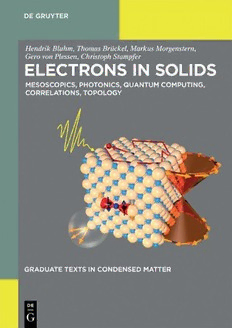
Electrons in Solids: Mesoscopics, Photonics, Quantum Computing, Correlations, Topology PDF
Preview Electrons in Solids: Mesoscopics, Photonics, Quantum Computing, Correlations, Topology
H.Bluhm,T.Brückel,M.Morgenstern,G.vonPlessen,C.Stampfer ElectronsinSolids Graduate Texts in Condensed Matter | SeriesEditor Prof.Dr.ChristianEnss HeidelbergUniversity Kirchhoff-InstituteforPhysics ImNeuenheimerFeld227 69120Heidelberg Germany Hendrik Bluhm, Thomas Brückel, Markus Morgenstern, Gero von Plessen, Christoph Stampfer Electrons in Solids | Mesoscopics, Photonics, QuantumComputing, Correlations, Topology Authors Prof.Dr.HendrikBluhm Prof.Dr.GerovonPlessen RWTHAachenUniversity RWTHAachenUniversity InstituteofPhysics(2C) InstituteofPhysics(1A) Otto-Blumenthal-Str.28 Otto-Blumenthal-Str.28 52056Aachen,Germany 52056Aachen,Germany [email protected] [email protected] Prof.Dr.ThomasBrückel Prof.Dr.ChristophStampfer ForschungszentrumJülichGmbH/ RWTHAachenUniversity RWTHAachenUniversity InstituteofPhysics(2A) FacultyofMathematics,Computer Otto-Blumenthal-Str.28 ScienceandNaturalSciences 52056Aachen,Germany JCNS-2&PGI-4 [email protected] 52425Jülich,Germany [email protected] Prof.Dr.MarkusMorgenstern RWTHAachenUniversity InstituteofPhysics(2B) Otto-Blumenthal-Str.28 52056Aachen,Germany [email protected] ISBN978-3-11-043831-4 e-ISBN(PDF)978-3-11-043832-1 e-ISBN(EPUB)978-3-11-042929-9 LibraryofCongressControlNumber:2018955522 BibliographicinformationpublishedbytheDeutscheNationalbibliothek TheDeutscheNationalbibliothekliststhispublicationintheDeutscheNationalbibliografie; detailedbibliographicdataareavailableontheInternetathttp://dnb.dnb.de. ©2019WalterdeGruyterGmbH,Berlin/Boston Coverimage:MarcoPratzer Typesetting:le-texpublishingservicesGmbH,Leipzig Printingandbinding:CPIbooksGmbH,Leck www.degruyter.com Preface Cuttingedgeresearchinmodernsolidstatephysicsischaracterizedontheonehand byhighlycomplexsystemswithvariousinteractionsbetweenquasi-particles.Inthis context,alsoanovelcharacterizationscheme,thatoftopology,hasenteredsolidstate physicsand allowsnewinsights intothe descriptionofquantum materials.Onthe otherhand,thereisastrongtendencytotracebacksolidstatephenomenaandsys- temstotheir quantumphysicalbasis,wherephasecoherence,wavefunctioninter- ference,superpositionandentanglement playanessentialrole.Thisisparticularly evidentinresearchonquantumtransportinnanostructuresorinquantumengineer- ing,wheresolidstatenanosystemsarestudiedwithrespecttoquantuminformation orsensorapplications.Thesetopicsusuallygobeyondthecontentofstandardcourses andtextbooksinsolidstatephysics.MyphysicscolleaguesattheRWTHAachenUni- versity,therefore,haveestablishedanadvancedcourseontopofthebasicsolidstate physicslectures,wheremasterandPhDstudentsareexposedtotheseimportantfields of modern research. The present textbook based on this advanced course provides some topicswhichhave exemplary characterand areparadigmaticfor this kind of latestcurrentresearchinsolidstatephysics.Fromadeeperunderstandingofthese examplesotherfieldsofmodernresearcharealsoeasilyaccessible. Itherefore recommend the book to all those who wantto divedeeper into this fascinatingfieldofmodernsolidstatephysics,tomasterandPhDstudents,butalso toscientistsstartinganewresearchfieldandwhowanttolearnsomeessentialsina reasonablyshorttime.Iwishthebookmuchsuccesssinceitpromotesourbeautiful science. HansLüth JülichAachenResearchAlliance https://doi.org/10.1515/9783110438321-201 Overview Thistextbook isthe result of acompulsory, advancedlecture courseinexperimen- talsolidstatephysicsgivenwithinthemasterscourseatRWTHAachenUniversity.It goesbeyondtheclassicaltopicsofferromagnetismandsuperconductivity.Thereby, it bridges the corresponding basic knowledge in solid state physics to more recent researchtopicssuchastopology or quantum computation.Inparticular,itaimsto guidestudentsthroughthedifferentlevelsofcomplexityinherentlygivenbythepar- tiallyclassical,partiallysemiclassicalandpartiallyquantummechanicaldescription ofsolidstateproperties,wherethelatteroftenemployssimplifiedHamiltoniansasso- calledtoymodels.Switchingbetweensuchdifferentdegreesofcomplexityisinherent tosolidstatephysics,sinceafullquantummechanicalsolutionofthemany-particle problemisnotavailable.Thus,onehastochooseadequateapproximations,strongly guidedbyexperimentalresults. Theconceptofthebookistoprovidetheconceptionalskillsneededtoselectan adequatemodeland,thus,anadequatelevelofcomplexity.Atthesametime,weaim tofosteranintuitionforthekeypropertiesofdifferenttypesofelectronsystemsunder differentconditions.Sinceweaddressexperimentalists,weoftenbuildonintuitive, heuristicargumentsinsteadofrigorouscalculationsand,moreover,alwayscombine our arguments with experimental results. Thisway ofreasoning providesa key in- sightintotherequiredinterplaybetweenexperimentsandtheory,whichallowsone tocorrectlyunderstandthefavorablepropertiesoftheunsolvable,basicSchrödinger orDiracequations. Theselectionoftopicsisnotmeanttobeexhaustiveintermsofmodernsolidstate physics,butprovidesafewdeliberatelychosenexamples,whichrepresentalineof increasingcomplexity.Westartwithmesoscopics,wherequantummechanicsenters mainlybythephaseoftheelectronicwavefunctionsrenderingthephasecoherence thedecisiveterm.Wecontinuewiththedescriptionofopticalpropertiesofsolidstate electrons,wherepureclassicalelectrodynamicsispartlysufficienttodescribethephe- nomena.However, thedescriptionof,e.g.,transitionratesalreadyrequirestheuse ofsuperpositionsofstationaryelectronicstates inacoherent quantummechanical fashion.Chapter3ofthebookdealswithsolid-statebasedquantumcomputing,ar- guablythemostimportantemergingapplicationofthequantummechanicaldynam- icsofsolidstateelectrons.Here,thecoherentquantummechanicaldescriptionofthe exploiteddegreesoffreedomiskey,whichwilleventuallybeusedforamoreefficient informationprocessingviasuperpositionstates,i.e.,multiplestationarystatesinpar- allel.Thehighdegreeofcontrolofthequantummechanicaldynamicsalsoenables anexperimentalinsightintothetransitionbetweenthequantummechanicalbehav- ioronthemicroscopicscaleandthephase-freeclassicalbehaviormostlyguidingour macroscopicscaleexperience. https://doi.org/10.1515/9783110438321-202 VIII | Overview InChapter4ofthebook,wetacklethenotoriouslydifficultelectron-electroninter- actionquantummechanicallyusingthewell-studiedexampleoftransitionmetalox- ides.WeshowhowsimplifiedtoymodelsoftheSchrödingerequationcaptureessen- tialpropertiesas,e.g.,thebandgapopening,whichappearsforanominallyhalffilled single-particleelectronbandduetotheelectron-electroninteraction(Mott–Hubbard transition).Thetoymodelsstartwithatightbindingdescription,whichreducesthe single-particleelectronwavefunctionstosingleatoms,beforeintroducingthecom- plexadditionalterms.Hence,wedealwithpoint-likestartingelectrons,suchthatthe phaseofthewavefunctionshasaminorinfluenceonthefinalpropertiesofthesys- tem.Thisapproachchangesinthelastchapterofthebook,wherewedescribeitin- erant electrons being prone to different types of interactions, namely the electron- phonon,theelectron-disorderandtheelectron-electroninteraction.Webeginwitha divergingperturbativeexample,thePeierlstransition.Afterwards,wewillguidestu- dents through the complex descriptionofband structures via topology. Finally,we willpresentemergentphenomenaofthemanyparticlecharacterdrivenbytheelec- tron-electroninteraction,suchasthefractionalchargeofelectronsappearinginfrac- tionalquantumHallphases.Thelatterdescriptionstressesakeymethodinsolidstate physics,namelythedescriptionofthesystembyquasiparticleswithaveryabstract meaning. Webelievethatthisselectionoftopicssetsthestudentsintoapositiontodealwith thedifferentlevelsofcomplexity,whicharetypicalforcurrentsolidstateresearch.It is,moreover,meanttoprovideabasetotackleothermodernresearchtopicssuchas, e.g., unconventional superconductivity, magnetoelectronics or advanced photonics employingmetamaterials.Hence,wepresentadedicatedupgradecoursetothewell- establishedcurriculuminsolidstatephysics.Wehopethatthisnovelapproachrelying onapartlyheuristicargumentationwillbesuccessfulatotheruniversitiestoo.Being awareofthefactthatadifferentselectionoftopicsmightbesuitedforthetaskaswell, weareinterestedinanytypeoffeedback. WewishtothankFabianHassler,VolkerMeden,andMarcusLiebmannforinsight- fuldiscussions,HansLüthforveryhelpfulcommentsafteracompletecross-reading ofthemanuscript,TjorvenJohnsenforcross-readingofsomepartsofthemanuscript, GereonGraffandFedericaHauptfortakingcareofamultitudeofformalities,Marco Pratzerfordesigningandmakingthecoverimage,aswellasThomasGraff,Tobias Cronert,PaulDoege,andJonathanConradforhelpwiththeoptimizationofallother images. MarkusMorgenstern(onbehalfofalltheauthors) RWTHAachenUniversityandJARA-FIT
